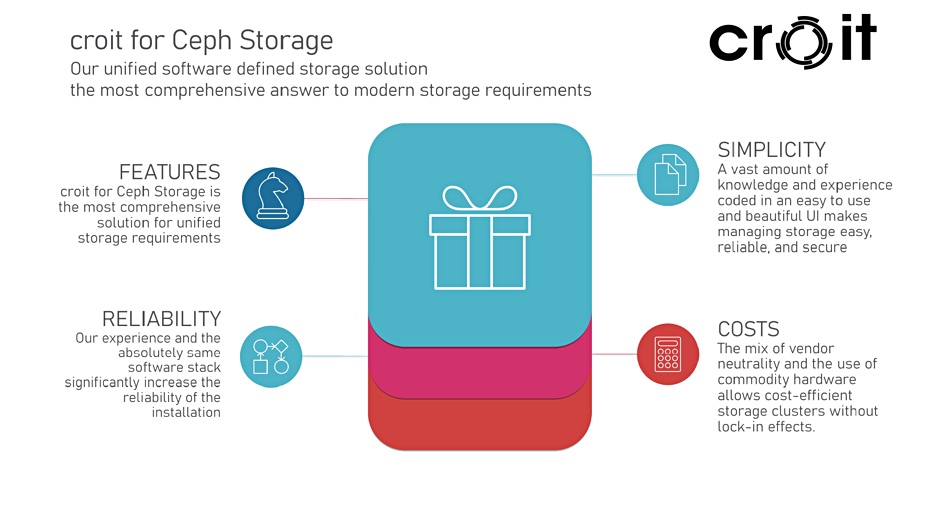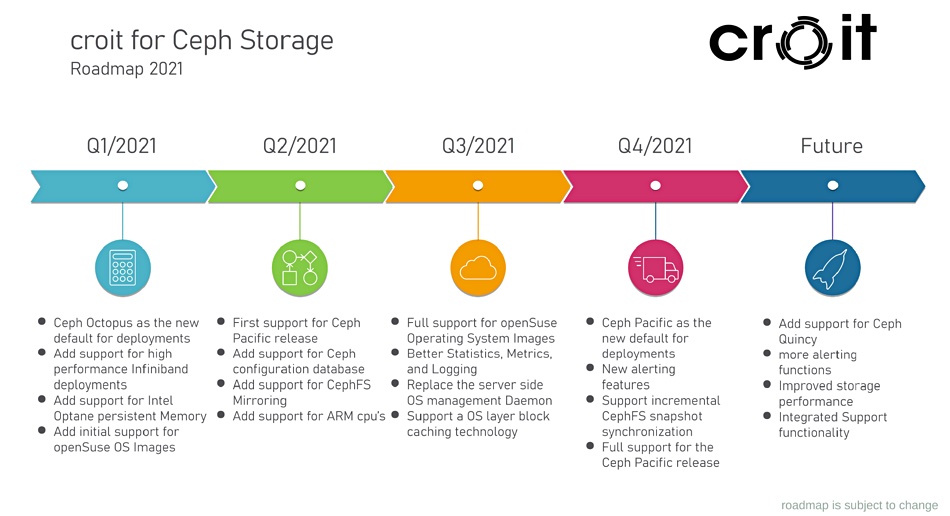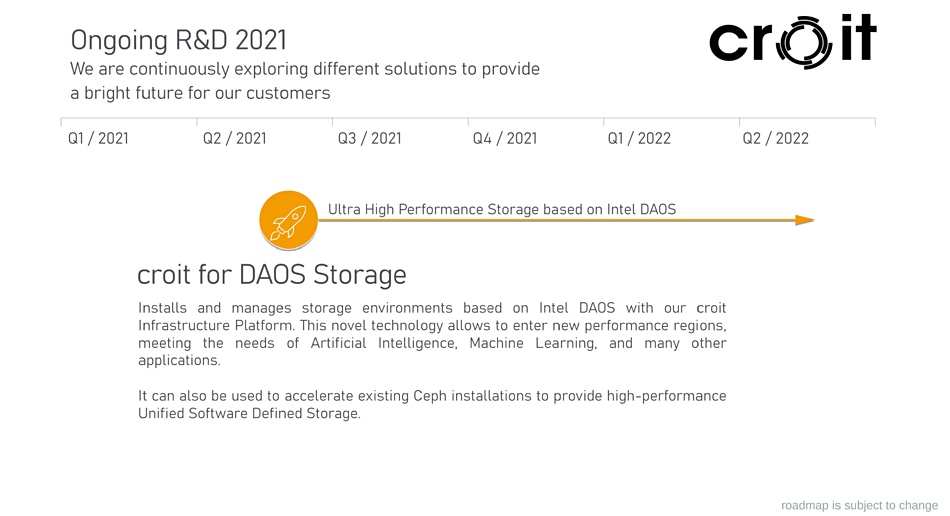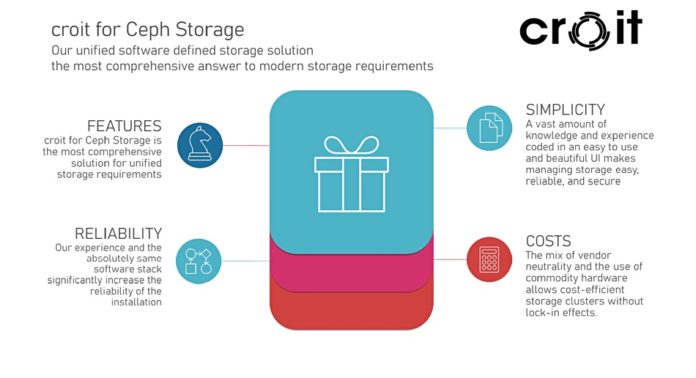Ceph software is a singular data storage technology, as it is open source and offers block, file and object access to data. But it has a reputation of being slow in performance, complicated to use, and hard to maintain. Also SUSE’s decision to withdraw from the Ceph market, which I revealed last month, raises questions about mainstream support for the technology.
So what are the benefits of Ceph, how can users overcome its challenges, and will this storage ever hit the big time? These were some of the questions I put to Martin Verges, co-founder and CEO of croit GMbH, a Ceph-specialist startup based in Munich.

Blocks & Files: Why is Ceph so important? Some might say that, since it provides block, file and object access to data it does nor provide specific high performance access for any one of these access methods.
Martin Verges: Ceph is the only open source storage solution available that combines block, file and object type of storage into one system. It is therefore an unbeatable generalist solution. Many users need the resulting flexibility much more than the possible performance gain of individual edge case high performance solutions.

Blocks & Files: Who are the main users of Ceph in terms of workload types and vertical markets?
Martin Verges: Ceph can be used for almost all business cases due to its flexibility. It can be found in low-cost archive and backup clusters as well as performance-optimised NVMe clusters for virtual machines or as a primary storage in high performance compute environments.
Blocks & Files: Why was croit founded and when? What is its purpose?
Martin Verges: We founded croit GmbH to simplify technologies and thus make them accessible to the widest possible range of users. As our first product we have developed a Ceph storage-based management solution, which coupled with support and service enables everyone to use Ceph in the enterprise in the best possible and reliable way. We are also working on implementing the same methodology and user friendly approach to Intel DAOS, which will be released this summer.
Blocks & Files: How many customers does Croit have and how does it make its money?
Martin Verges: We currently have over 200 customers around the world. The main streams of income for the company are software licensing, professional consulting, reactive and emergency support and training offers.
Since the company was founded [in 2017], we have been growing continuously at well over 100 per cent year over year.
Blocks & Files: What effect will the withdrawal of SUSE from the Ceph market have?
Martin Verges: As a founding member of the Ceph Foundation, we deeply regret SUSE’s withdrawal from the Ceph market. SUSE has contributed greatly to the development of Ceph in the past and we are very grateful for that. Nevertheless, we as a company have/are benefiting from the departure with increased demand for our solution and consulting.
Blocks & Files: Ceph is thought to be hard and difficult to use? Why is this and how can the perception be changed?
Martin Verges: Because of the richness of features and flexibility that Ceph offers, Ceph is not easy to understand and operate. Although it gets better from version to version, deploying the open source version in production is quite a complex process and prone to problems due to all the options available to the operator. That’s why there are specialised companies like us that offer customers the ease of use and security they need to deploy Ceph in the enterprise environment.
Furthermore, this is exactly what makes our solution stand out, we are the only provider to offer a horizontally and vertically integrated solution that is completely web based and allows the operation of Ceph clusters in a simple and reliable way.

Blocks & Files: Ceph is criticised for being relatively slow compared to other software products dedicated to block, file or object access? What does Croit think about this view?
Martin Verges: This criticism is sometimes not wrong, however, it mostly concerns small clusters. Ceph can also be very performant with the right design and hardware. The Ceph developers are working hard to make Ceph better.
For example, the switch from FileStore to BlueStore has halved the IO overhead. With the SeaStore / Crimson OSD under development, there will be further significant performance improvements. Also, for example, with the new Pacific release, the inflation of particularly small files and objects has been massively reduced.
Blocks & Files: How does Croit view Ceph in the context of supply data to AI-type GPU servers such as those from Nvidia?
Martin Verges: We at croit think that more development effort is needed to make Ceph suitable for more usage scenarios. In general, however, Ceph is an excellent and sufficiently powerful solution for many workloads. It works reliably and especially very securely apart from the data sheets. We do see that there is also a need for very high performance storage that Ceph is not the best fit, and that is one of the reason we have been working closely with Intel in productising DAOS in the same manner as we did for Ceph.

Blocks & Files: Can Ceph be used to supply storage to stateful containers; for example, via the Kubernetes CSI plug-in?
Martin Verges: Yes, it is possible to use Ceph with the Kubernetes CSI interface without any problems. This allows persistent data to be processed by multiple containers simultaneously via the CephFS file system, as well as exclusive block devices.
Blocks & Files: How does Croit view the future of Ceph?
Martin Verges: We believe Ceph will continue to dominate the market as the best open source storage solution. Furthermore, due to the ongoing development, it can be assumed that Ceph will be adapted to modern workloads and constantly expanded with further functions.
Ceph is therefore the right choice for future-oriented storage solutions, which, as can currently be seen very clearly with SUSE, works independently of individual companies. This provides investment security, flexibility and a wide range of options.








